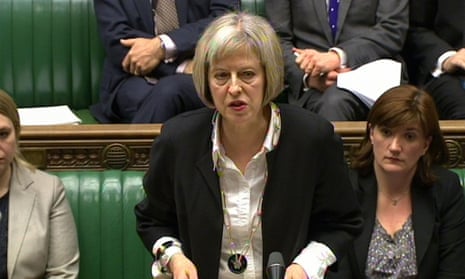Theresa May has urged the media to act responsibly in the reporting of terror suspects such as Mohammed Emwazi and on cases such as that of the London schoolgirls who are believed to have travelled to Syria to join Islamic State.
As she faced intense pressure from Labour over whether the government had helped extremists by abolishing control orders, the home secretary called on news outlets to show restraint if lives are at risk. “We are all absolutely appalled and shocked at the horrific barbarism that has been shown by Isil [Isis] and we would expect that to be reflected in any reporting that is brought forward,” the home secretary told MPs.
May spoke out after she was summoned to the House of Commons to answer an urgent question over whether the government’s decision to abolish control orders in 2012 had made it easier for terror suspects to travel to Syria. Yvette Cooper, the shadow home secretary, highlighted an Observer report that three members of Emwazi’s west London network were under control orders in 2011. The men were subject to the “relocation” element of control orders, which forced suspects to move to a town or city that could be two to three hours from their home.
Court papers said that two members of the network, who had the less stringent replacement for control orders, known as Tpims (terrorism prevention and investigation measures), later absconded. Emwazi fled to Syria shortly after the change.
Cooper acknowledged that May recently restored the relocation elements to Tpims. But the shadow home secretary asked: “Does she believe that her decision to remove relocation powers made it easier for this west London network to operate, recruit and send people to Syria?”
May largely sidestepped Cooper’s main charge – that the abolition of control orders may have helped extremists – by saying that the measures were not sustainable because they were being “whittled away” by the courts. David Anderson, the independent reviewer of terrorism legislation, has said that the relocation element of most control orders “was upheld by the courts as necessary and proportionate”.
The home secretary also gave a carefully phrased response when she was asked by the Labour MP Heidi Alexander about the claim by Helen Ball, deputy assistant commissioner of the Metropolitan police, that control orders were a valuable tool in disrupting terror networks.
May said: “When we changed the control order regime, we discussed the matter with the agencies and with the police and they were absolutely clear that the changes we were making did not significantly increase the risk.”
Lord Carlile of Berriew, who was the independent reviewer of terrorist legislation until 2011, said there was a “realistic prospect” that a control order with a compulsory relocation could have been imposed on Emwazi. “If that had been the case, he would not have done what he’s done in recent times,” Carlile told Sky News.
May endured additional questioning from MPs over the media’s reporting of the naming of Emwazi. Julian Lewis, a Conservative member of parliament’s security and intelligence committee, asked: “Does the home secretary agree with me that it is quite right that when the identity of some brainwashed narcissist and psychopathic killer is exposed, there should be wide media coverage of it? But does she also agree with me that a degree of self-restraint at some point ought to be necessary if we are not to build up these bogeymen in precisely the way they intend us to do?”
May responded by pressing the media to tread carefully if individuals are in danger. “As Helen Ball made clear in her interview yesterday, there are other reasons for restraint being applied – when there are ongoing investigations and when there may be a risk to life involved.”
May was sympathetic to a suggestion by Nia Griffith, the Labour MP for Llanelli, that the media should not have named the young schoolgirls who are believed to have travelled to Syria. The home secretary said: “A free press is obviously part of what underpins our democracy. But I would expect the media to be responsible in the way in which they deal with these particular issues in a number of ways.
“She has mentioned the young girls travelling and whether or not their names should have been revealed. I would simply say to the media that these are important issues. These are families in that case under considerable stress and trauma suffering as a result of their daughters having gone to Syria. I would expect the media to respect that.”
